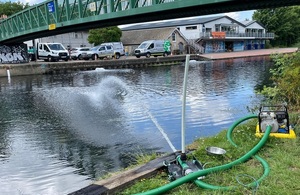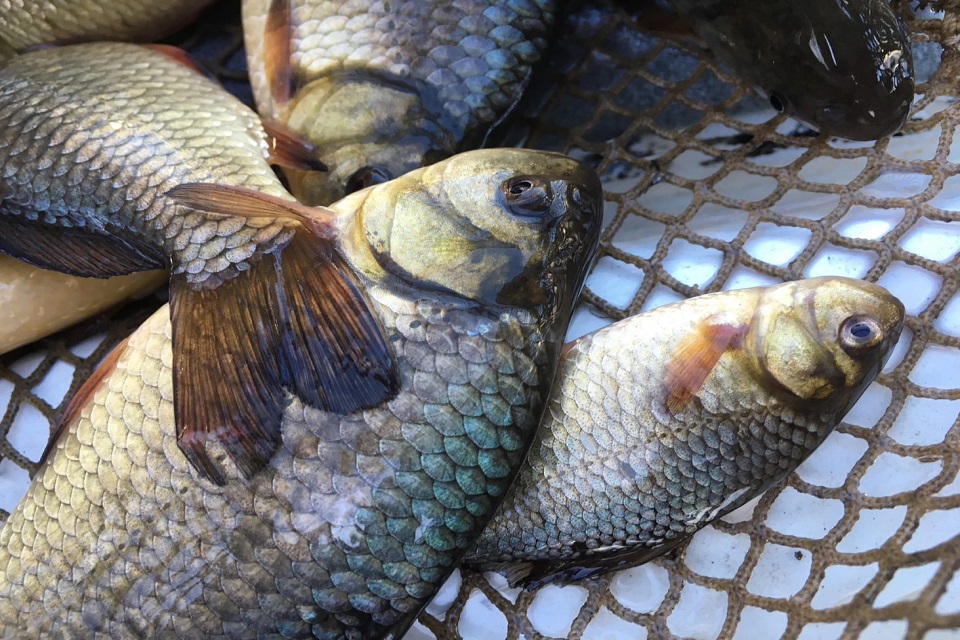Public urged to help protect fish this summer
South East fisheries officers are responding to hundreds of fish in distress as warmer temperatures raise risk of fish dying and algal blooms in watercourses.

The Environment Agency's incident response includes pumping air into rivers to provide much-needed oxygen for fish
With temperatures climbing, the Environment Agency is asking the public to help protect our rivers and watercourses this summer by reporting sightings of fish in distress and algal blooms.
Last summer across the South East, the Environment Agency responded to 88 serious incidents directly related to hot weather impacts on the environment. With a prolonged spell of hot and dry conditions, that figure could be set to rise even further this year.
This week alone, Environment Agency fisheries officers have saved thousands of fish in responding to 27 significant incidents in the South East caused by hot weather impacts on the water environment.
Warm weather can be highly dangerous for fish, particularly for more susceptible species like salmon and pike. Hot and sunny weather typically triggers algal blooms, which can strip dissolved oxygen levels out of our waters, leading to fish becoming distressed and, in some cases, dying.
Signs that fish are in distress include appearing lethargic and/or unresponsive, sometimes close to the bank, tight shoaling and obvious gasping at the surface, and signs of infection or fungus.
Also in freshwaters, particularly lakes, blue green algae (cyanobacteria) especially thrive in warm conditions, and has the potential to be harmful by forming blooms and scums which can be highly toxic to humans, fish and animals.
Blooms can discolour the water, varying between blue-green, green or greenish brown, and should be avoided, as they can be toxic and can lead to a variety of symptoms including vomiting and diarrhoea. For dogs and livestock, ingestion of scums can be fatal, so pet owners and farmers need to keep animals away.
Environment Agency incident response work includes deploying aeration equipment to restore dissolved oxygen levels in watercourses that it manages, providing expert advice to angling clubs, fisheries and anglers, and occasionally, as a last resort, relocating fish. All this work is funded by fishing licence income – and provides a vital lifeline to fisheries when they most need it.

The public can report any fish in distress or algal blooms that turn the colour of the water blue, green or brown, to the Environment Agency’s incident hotline any time on 0800 80 70 60
Environment Agency officers prioritise their response effort on incidents which pose the greatest risk to the environment, often working with professional partners to limit environmental harm.
Dave Webb, an Environment Agency fisheries manager, said:
We are already working hard to mitigate the impacts of recent high temperatures and are monitoring the situation closely when it comes to protecting fish at risk.
We aim to respond to reports of fish in distress as quickly as possible and will assist and advise landowners and fisheries who look after private lakes, ponds and watercourses. Help from the public goes a very long way, which is why we provide free advice to all on how to protect fish during hot weather.
If you see any fish in distress, algal blooms or suspect a fish-disease outbreak, please tell us immediately by calling the Environment Agency’s national incident hotline on 0800 80 70 60.
The causes of fish-kills are many and varied, but most often occur due to poor water quality with low-oxygen levels, disease or a combination of both, with warmer weather significantly increasing the likelihood of problems occurring.
Members of the public are urged to report any algal blooms to the Environment Agency’s incident hotline: 0800 80 70 60. Once an algal bloom is confirmed by the Environment Agency, that information is sent to the landowners and other statutory bodies so that any necessary action can be taken.
Advice for the public and landowners can be found at: https://www.gov.uk/government/publications/algal-blooms-advice-for-the-public-and-landowners/algal-blooms-advice-for-the-public-and-landowners
The Environment Agency’s guide for fishery owners and angling clubs is available here: https://environmentagency.blog.gov.uk/2022/07/08/preparing-your-fishery-for-the-summer/